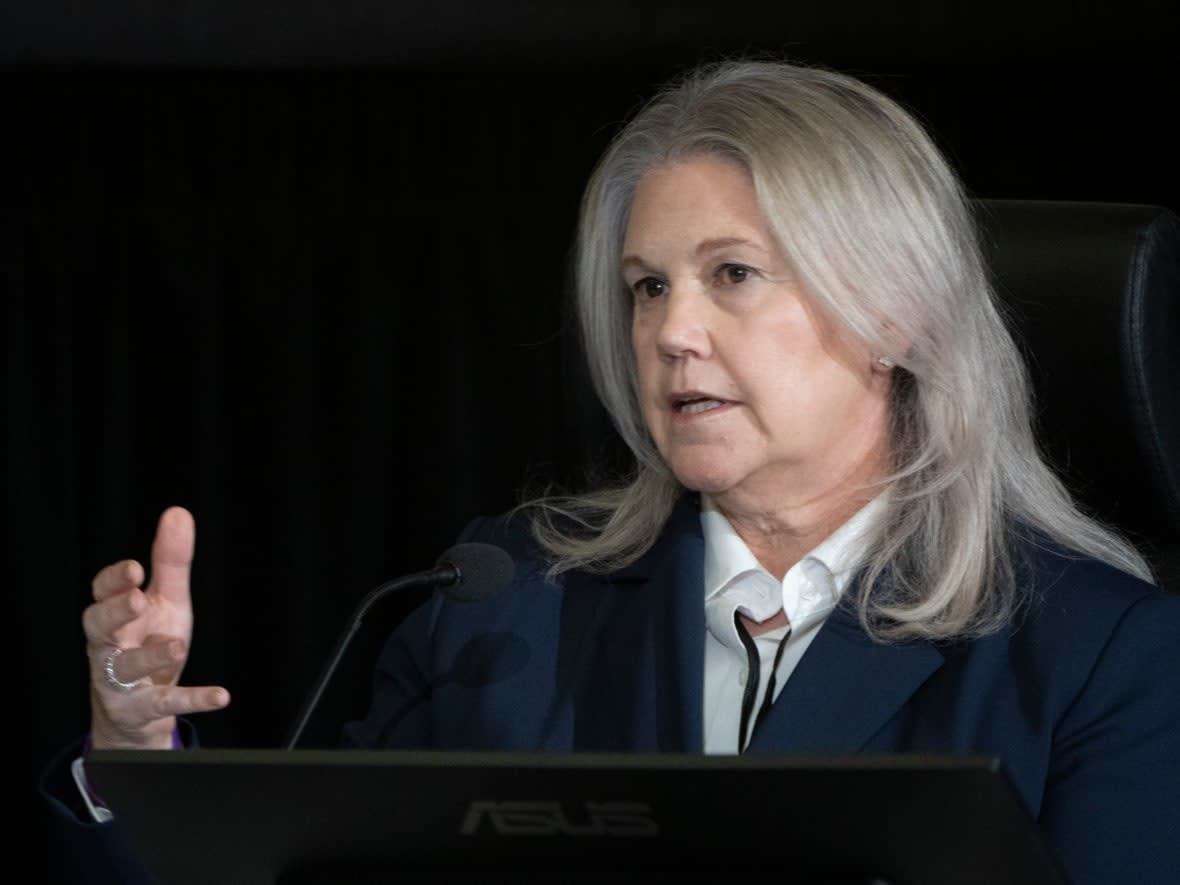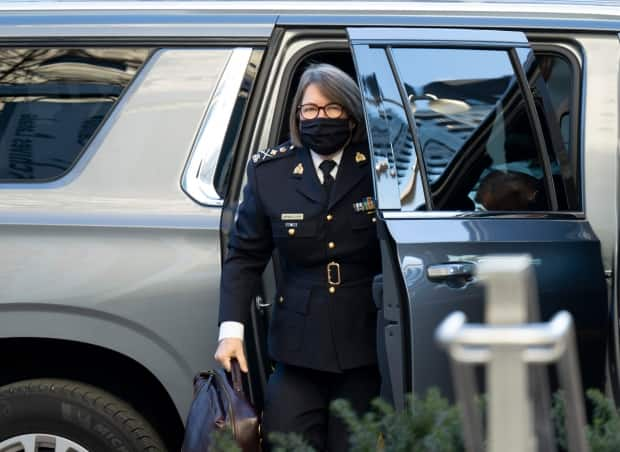PM's national security adviser suggested Emergencies Act's definition of a security threat should change

The prime minister's security and intelligence adviser says that the definition of a "threat to security of Canada" under the terms of the Emergencies Act should be reconsidered to better reflect the times.
Jody Thomas's comments to the Public Order Emergency Commission emerged as the commission continues its probe to determine whether the federal government's decision to invoke the act to clear Ottawa of protesters opposed to pandemic measures protests was justified.
Earlier this week, the commission heard that the Canadian Security Intelligence Service (CSIS) didn't believe the self-styled Freedom Convoy constituted a threat to national security, according to the definition in its enabling law.
To deploy the Emergencies Act, cabinet must have reasonable grounds to believe a public order emergency exists — which the Act defines as one that "arises from threats to the security of Canada that are so serious as to be a national emergency."

The act defers to CSIS's definition of threats — which includes serious violence against persons or property, espionage, foreign interference or an intent to overthrow the government by violence.
In an interview with commission lawyers this fall, Thomas (whose title is often shortened to 'NSIA') and other officials suggested that this definition be "reconsidered."
"The panel explained that security threats have evolved in the 40-year period since the enactment of the Emergencies Act," says a summary of that conversation.
"The panel concluded that the reference to a threat to the security of Canada as defined by section 2 of the CSIS Act in section 16 of the Emergencies Act should be reconsidered."
The act was passed in 1988 as a replacement for the War Measures Act. It had never been used before February of this year and is widely considered a measure of last resort.
Thomas told the commission she was aware CSIS concluded the protests did not meet the threshold to declare a national emergency, but she felt the intelligence agency's mandate was too narrow.
The interview summary said some CSIS targets were present at the protests but they would have to escalate from rhetoric to inciting or carrying out serious violence to meet the service's legal threshold for declaring a national emergency.
"In contrast, the reality was broader than that," said the document.
"In NSIA Thomas' view, it was the totality of the circumstances that led to what she considered to be the existence of a threat to the security of Canada, and therefore, [a] public order emergency."
WATCH | National security threat 'wasn't really defined,' PM's national security adviser says
Thomas said she considered multiple factors in coming to that conclusion: the blockades shutting down several key border crossings, the protesters' occupation of downtown Ottawa and the fact that security officials did not know what might be in the large trucks parked in the capital during the protests.
"They did not know how long it would go on or how much larger it could get," said the interview summary.
"Once a tipping point of violence was reached, it would be too late, even with the police presence available."
Thomas contradicts RCMP's Lucki
In a stunning moment Thursday, Thomas contradicted testimony given by the country's top Mountie about that police presence.
RCMP Commissioner Brenda Lucki said that on the eve of the federal government invoking the Emergencies Act, she told Public Safety Minister Marco Mendicino's chief of staff that she felt police had not exhausted all legal tools.
But Thomas said Lucki failed to pass that information on during a meeting with senior officials on Feb. 13.
"Individuals who are at that meeting are expected to provide information that is of use to decision makers ... the prime minister in his cabinet," Thomas said Thursday.

"If there is useful or critical information it needs to be provided, whether you are on the speaking list or not."
Thomas also said Lucki never gave notice to the federal cabinet that police had firmed up an operational plan to end the blockades.
"There was no evidence there was a plan," said Thomas. "We had been told there was a plan multiple times."
Thomas's testimony comes near the end of a week of hearings that delved deeper into the briefings cabinet was receiving as it considered whether to trigger the Emergencies Act.
On Monday, Brendan Miller, a lawyer for some of the convoy organizers, entered into evidence a summary of an interview CSIS Director David Vigneault gave the commission.
It showed the intelligence agency had concerns about invoking the Emergencies Act.
"[Vigneault] felt an obligation to clearly convey the service's position that there did not exist a threat to the security of Canada as defined by the service's legal mandate," said the document.
Rob Stewart, deputy minister of the federal Department of Public Safety, said the government would have a broader interpretation of what constitutes a national security threat.
The commission heard earlier this week that Thomas asked for an urgent threat assessment just before noon on Feb. 14 — the day the federal government invoked the act.
"The characters involved. The weapons. The motivation. Clearly this isn't just COVID and is a threat to democracy and rule of law," Thomas wrote at the time.
A Feb. 10 email entered into evidence Thursday showed the Privy Council Office was looking into the definition of national security.
"As you know, one of the challenges on this issue is the [government of Canada] never ended up formally defining it," wrote Philippe Lafortune, an employee at the PCO.
"Looking at all of this, and ongoing events, I am of the opinion downtown Ottawa may not constitute a national security issue but border integrity could be."
Lawful and unlawful protests discussed
Thomas said she and Vigneault met with deputy ministers on Feb. 14 and discussed how to define the threat posed by the protests.
She questioned whether events like the one that unfolded in Washington, D.C. on Jan. 6, 2021 — when demonstrators protesting the results of the presidential election stormed the Capitol building — should be the benchmark for defining something as a violent protest.
"Or is the violence that people of Ottawa were experiencing on the streets, the inability of people in Windsor to conduct their lives, the inability of town of Coutts to function, is that a line?" Thomas testified Thursday.
"I don't have an answer for it."
Vigneault is expected to testify before the commission inquiry next week.


